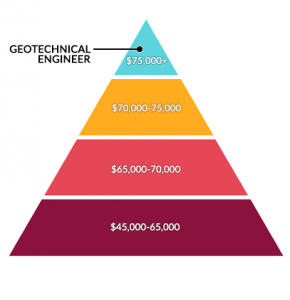Things about Geotheta
Things about Geotheta
Blog Article
Geotheta for Dummies
Table of ContentsThe Ultimate Guide To GeothetaHow Geotheta can Save You Time, Stress, and Money.The Buzz on GeothetaThe Basic Principles Of Geotheta All About Geotheta

They conduct website examinations, collect samples, do laboratory examinations, and evaluate information to examine the viability of the ground for building projects - Consulting Engineer. Based on their findings, geotechnical engineers give suggestions for foundation style, slope security, preserving structures, and reduction of geotechnical risks. They work together with various other specialists, such as designers, architectural designers, and building teams, to make certain that geotechnical considerations are incorporated into the general task design and application
By assessing the behavior and residential or commercial properties of dirt and rock, they can identify potential geotechnical hazards such as landslides, soil settlement, or incline instability. Their proficiency helps stop failings or crashes that might jeopardize lives and residential or commercial property. Below are some detailed tasks and obligations of a geotechnical designer: Website Examination: Geotechnical designers conduct website examinations to collect information on subsurface conditions.
They analyze the information to recognize the residential properties and habits of the soil and rock, including their stamina, leaks in the structure, compaction attributes, and groundwater problems. Geotechnical Evaluation and Style: Geotechnical designers analyze the information accumulated during website examinations to examine the security and viability of the website for building and construction tasks. They carry out geotechnical computations and modeling to evaluate variables such as birthing ability, settlement, slope stability, side planet stress, and groundwater circulation.
See This Report on Geotheta
Foundation Style: Geotechnical designers play a vital function in creating structures that can securely sustain the designated framework. They evaluate the soil conditions and load demands to figure out the suitable structure type, such as superficial foundations (e.g., footings), deep foundations (e.g (https://filesharingtalk.com/members/599923-geotheta)., heaps), or specialized techniques like soil renovation. They think about elements such as settlement limits, birthing capacity, and soil-structure interaction to develop optimal foundation layouts
They examine building and construction plans, monitor website tasks, and conduct area inspections to verify that the style recommendations are followed. If unpredicted geotechnical issues arise, they assess the situation and give recommendations for remediation or adjustments to the design. Danger Evaluation and Mitigation: Geotechnical designers evaluate geotechnical dangers and dangers connected with the project site, such as landslides, liquefaction, or dirt disintegration.

Partnership and Communication: Geotechnical designers work closely with various other experts associated with a task, such as designers, architectural designers, and construction groups. Efficient interaction and partnership are important to incorporate geotechnical considerations right into the overall task style and construction procedure. Geotechnical engineers give technical proficiency, solution queries, and make certain that geotechnical demands are fulfilled.
Everything about Geotheta
Here are some types of geotechnical designers: Foundation Engineer: Foundation engineers concentrate on developing and assessing foundations for structures. They examine the soil conditions, tons demands, and website attributes to figure out one of the most appropriate structure kind and design, such as shallow foundations, deep structures, or specialized methods like stack structures.
They assess the aspects influencing slope security, such as dirt residential properties, groundwater problems, and slope geometry, and develop strategies to stop slope failings and mitigate risks. Earthquake Engineer: Earthquake designers focus on evaluating and developing structures to stand up to seismic pressures. They assess the seismic risk of a website, evaluate dirt liquefaction possibility, and develop seismic design criteria to make certain the safety and durability of structures during earthquakes.
They do field screening, collect samples, and analyze the gathered data to define the soil properties, geologic formations, and groundwater problems at a site. Geotechnical Instrumentation Designer: Geotechnical instrumentation designers concentrate on surveillance and gauging the actions of soil, rock, and structures. They mount and preserve instrumentation systems that check variables such as dirt settlement, groundwater degrees, slope movements, and architectural variations to evaluate efficiency and supply early cautions of prospective issues.
The Best Guide To Geotheta
They perform tests such as triaxial examinations, debt consolidation examinations, direct shear examinations, and permeability examinations to gather data for geotechnical evaluation and layout. Geosynthetics Designer: Geosynthetics designers specialize in the style and application of geosynthetic products, such as geotextiles, geogrids, and geomembranes. They use these materials to boost soil stability, strengthen inclines, provide water drainage options, and control disintegration.
They tend to be investigative people, which means they're intellectual, blog introspective, and investigative. They are curious, methodical, reasonable, logical, and sensible. Some of them are likewise social, indicating they're kind, charitable, participating, person, caring, useful, understanding, tactful, and pleasant. Does this seem like you? Take our cost-free career test to figure out if geotechnical engineer is among your leading occupation suits.
In the office atmosphere, geotechnical engineers utilize specialized software devices to do computations, produce designs, and assess information. They prepare reports, review project specifications, connect with customers and team participants, and coordinate task tasks. The office setting provides a helpful atmosphere for research, evaluation, and partnership with other experts involved in the task.
Geotheta Things To Know Before You Buy
They often visit job websites to perform site examinations, evaluate geotechnical problems, and gather information for evaluation. These sees involve taking a trip to different places, occasionally in remote or difficult surfaces. Geotechnical engineers might execute soil sampling, conduct examinations, and monitor construction tasks to guarantee that the geotechnical facets of the project are being carried out appropriately.
Geotechnical engineers additionally function in specialized geotechnical laboratories. In these facilities, they perform experiments, carry out tests on dirt and rock examples, and analyze the engineering properties of the materials. Geotechnical lab designers work thoroughly in these environments, dealing with screening tools, operating tools, and videotaping data. They collaborate with other lab team to ensure accurate and reputable screening outcomes.
Report this page